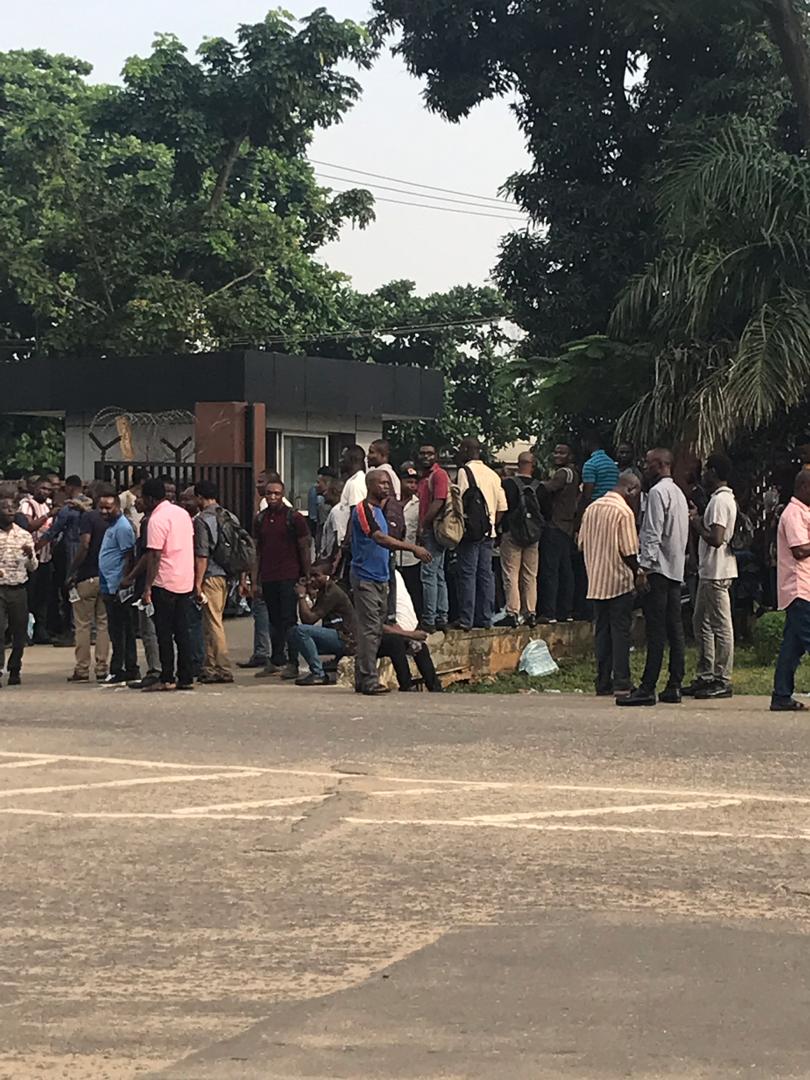A chartered Korean Air flight is scheduled to depart Georgia on Thursday afternoon, carrying over 300 South Korean workers detained by United States immigration officials last week, according to a South Korean government source.
The aircraft, which arrived in Atlanta from Seoul on Wednesday, is expected to land at Incheon International Airport by Friday afternoon.
Officials confirmed that the workers will not be subjected to handcuffs or any other form of physical restraint during their return.
However, despite the resolution, diplomatic and economic tensions between Washington and Seoul appear far from settled.
South Korea’s Foreign Minister, Cho Hyun, met with U.S. Secretary of State, Marco Rubio, on Wednesday, urging that the workers face “no disadvantages for future visits to the U.S., since they are not criminals,” as stated by the ministry.
Images previously released by U.S. Immigration and Customs Enforcement (ICE), which showed the workers shackled, ignited public outrage in South Korea, where the incident is widely seen as disrespectful to a key ally.
“It’s really no way to treat your friends,” said Cho Hee-kyoung, a law professor at Hongik University in Seoul, describing the detention and factory raid as a surprise move by the Trump administration.
The workers were apprehended during an ICE operation at a Hyundai-LG Energy Solution battery plant under construction in Ellabell, Georgia. Both companies are major players in South Korea’s industrial sector and have invested heavily in U.S.-based projects.
South Korea had earlier pledged billions of dollars in investment into the U.S. economy, and the detentions have prompted concern that such actions could jeopardize future cooperation. Despite the release deal announced by Seoul on Sunday, details of the agreement remain unclear. The U.S. State Department’s readout of the Cho-Rubio meeting did not mention the incident but reiterated Washington’s appreciation for South Korean investment.
The backlash in South Korea, though not marked by mass protests, has been pronounced in the media. Business leaders have called on the government to negotiate visa quotas for skilled Korean workers. The conservative Chosun Ilbo reported growing demands for permanent visa arrangements, while Hankook Ilbo pointed to rising investor concerns about “Trump risk.” The progressive Hankyoreh denounced what it called the U.S.’s “double-dealing,” describing the incident as “extremely regrettable.”
Former First Vice Foreign Minister Choi Jong Kun criticized the detentions, saying, “It was like ‘a slap in the face’ moment,” especially given that the factory projects were initiated at Washington’s request. He emphasized that the workers were temporary and had no intention of overstaying.
Cho, the law professor, noted that such short-term work arrangements had previously been tolerated despite minor visa technicalities, mainly due to the limited availability of H1 visas.
Charles Kuck, an immigration attorney representing two of the detained engineers, argued they were lawfully employed under a visa waiver and were scheduled to return home upon completing their assignments.
Acknowledging the shortage of skilled worker visas, Representative Young Kim introduced the “Partner with Korea Act” in July, proposing the creation of 15,000 E-4 visas annually for Korean professionals. The bill remains pending in the House Judiciary Committee.
The broader trade relationship between both countries also remains under review. In July, former President Donald Trump unveiled a $350 billion investment plan with South Korea aimed at job creation in the U.S., though experts caution that many of these projects depend on foreign expertise for initial operations.
Chang Sang-sik of the Korea International Trade Association criticized the U.S. approach, saying, “You demand investment but criminalize the workers who make those investments possible. That’s two-faced.”
President Lee Jae Myung called the detentions in Georgia “unjust infringements on the activities of our people and businesses” and urged that such incidents not be repeated.
Despite the diplomatic tension, South Korea remains cautious in its response, mindful of the ongoing strategic military alliance and the presence of 28,500 American troops on the peninsula—a critical element of Seoul’s defense against North Korean threats.

